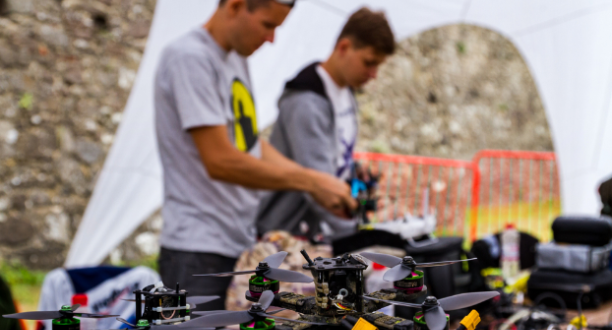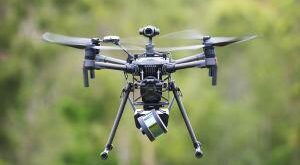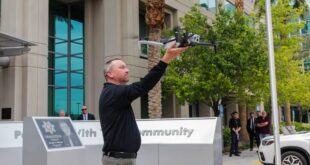staff
The following is a guest post from John Saginario: FPV flyer, writer and host of the Wild Flyers podcast.
Dozens of people are huddled over their flying contraptions, fixing broken parts and making final tweaks in preparation for a regional drone race. It’s a competition nearly a year in the making. And for many participants, it will last about 2 minutes. Money is on the line, not to mention some fame and bragging rights, in a scene that’s playing out right now in flying fields across the country.
But it’s not financial gain that fuels these competitors. It’s their passion for FPV, First Person View, a type of model aircraft flying that uses a camera to put the participant in a “cockpit” no wider than a tennis ball. It’s an exciting ride. But the runway could soon run out.
Many hobbyists across the nation are concerned that if a group of lawmakers, federal regulators and drone industry lobbyists have their way — this type of flying may soon be severely restricted, or even against the law.
Section 336
At the center of this fierce debate is a provision of the FAA Modernization and Reform Act of 2012, known as the “Special Rule for Model Aircraft.”
In essence, the Special Rule prevents the FAA from creating or enforcing any rules or regulations regarding model aircraft, so long as the aircraft follows some basic guidelines. It has to be flown for recreational purposes only, it can’t weigh more than 55 pounds, it can’t interfere in any way with manned aircraft, and its operator must adhere to a set of “community-based safety guidelines” that set out additional rules for safe operation.
For now, those rules come from the Academy of Model Aeronautics (AMA) which has existed, in some form or another, for more than 80 years. And by and large drone racers, freestyle flyers and pilots who like to fly in their local parks have adhered to the AMA’s guidelines.
You may remember the name John Taylor. He’s the Maryland attorney and hobbyist who sued the FAA over its requirement that recreational pilots register their drones. And in 2017, a federal court agreed with him — effectively ending the FAA’s program and handing a (short-lived) victory to the drone hobby.
But a few months later, Congress stepped in and reinstated the registry. And in early July, a different federal court upheld the FAA’s authority to regulate hobbyist drone use.
A Hobby Under Fire
The concern among hobbyists is some of the proposed regulation changes, or the outright repeal of Section 336, could severely limit what has otherwise been a safe and legal activity — and stifle innovation in the drone space.
Under the guidance of the AMA, and other organizations like MultiGP and DRL, the drone hobby has grown to a billion dollar industry. Retailers have created jobs nationwide selling parts and service, and several racing leagues have propelled the hobby into a sport that’s been broadcast on traditional cable channels like ESPN.
But under some proposals, such as limits on where, when and how fast you can fly, the nascent drone racing industry could come to a crashing halt.
Requiring expensive tracking hardware on all model aircraft, some of which cost hundreds of dollars, could price thousands of hobbyists out of the market. That would hurt the nation’s network of quadcopter manufacturers, builders and retailers, hundreds of small businesses that rely on this industry’s ability to thrive.
And in the end, no amount of regulation or restrictions will stop bad actors from breaking the rules. Despite the safety guidelines already in place, some reckless pilots have flown in restricted areas, into the flight paths of passenger aircraft, or interfered with firefighting efforts.
But the good the drone industry as a whole does, and will continue to do, from disaster recovery and rescue operations, to STEM educational programs in schools, and bringing passionate people together — far outweighs the bad that’s happened outside those efforts.
Hobbyists are not asking for lawless skies or zero regulation. We’re pushing for common sense rules that protect and support recreational pilots, commercial interests and the public alike, to keep the skies safe and friendly for all.
 John Saginario is the host of the Wild Flyers Podcast (www.soundcloud.com/wild-
John Saginario is the host of the Wild Flyers Podcast (www.soundcloud.com/wild-
 Unmanned Aerial Vehicle The latest drone news
Unmanned Aerial Vehicle The latest drone news




